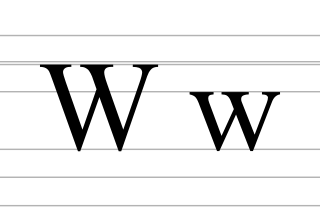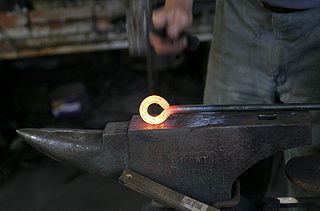
W, or w, is the twenty-third letter of the Latin alphabet, used in the modern English alphabet, the alphabets of other western European languages and others worldwide. Its name in English is double-u, plural double-ues.
The toponymy of England derives from a variety of linguistic origins. Many English toponyms have been corrupted and broken down over the years, due to language changes which have caused the original meanings to be lost. In some cases, words used in these place-names are derived from languages that are extinct, and of which there are no known definitions. Place-names may also be compounds composed of elements derived from two or more languages from different periods. The majority of the toponyms predate the radical changes in the English language triggered by the Norman Conquest, and some Celtic names even predate the arrival of the Anglo-Saxons in the first millennium AD.
Waring is an English surname with two derivation hypotheses: from the Frankish Warin, meaning 'guard,' via Norman French Guarin, or from the Anglo-Saxon Wæring, meaning 'confederate' or, more literally, 'oath companion.' Both hypotheses suggest that Wareing is a variant of this name. Notable people with the surname include:
In much of the "Old World" the names of many places cannot easily be interpreted or understood; they do not convey any apparent meaning in the modern language of the area. This is due to a general set of processes through which place names evolve over time, until their obvious meaning is lost. In contrast, in the "New World", many place names' origins are known.

Smith is an occupational surname originating in England. It is the most prevalent surname in the United Kingdom, the United States, Australia, Canada, and New Zealand, and the fifth most common surname in the Republic of Ireland. In the United States, the surname Smith is particularly prevalent among those of English, Scottish, and Irish descent, but is also a common surname among African-Americans, which can be attributed either to African slaves having been given the surname of their masters, or to being an occupational name, as some southern African-Americans took this surname to reflect their or their father's trade. 2,442,977 Americans shared the surname Smith at the time of the 2010 census, and more than 500,000 people shared it in the United Kingdom as of 2006. At the turn of the 20th century, the surname was sufficiently prevalent in England to have prompted the statement: "Common to every village in England, north, south, east, and west"; and sufficiently common on the (European) continent to be "common in most countries of Europe".
Hackett is an English surname found throughout the British Isles and the English diaspora.

The Norse–Gaels were a people of mixed Gaelic and Norse ancestry and culture. They emerged in the Viking Age, when Vikings who settled in Ireland and in Scotland became Gaelicised and intermarried with Gaels. The Norse–Gaels dominated much of the Irish Sea and Scottish Sea regions from the 9th to 12th centuries. They founded the Kingdom of the Isles, the Kingdom of Dublin, the Lordship of Galloway, and briefly ruled the Kingdom of York. The most powerful Norse–Gaelic dynasty were the Uí Ímair or House of Ivar.
Davis is a surname of English and Welsh origin. As an English surname it may be a corruption of Davy or a reference to King David in the Old Testament. As a Welsh surname may be a corruption of Dyfed, related to Irish colonists who occupied an area of southwest Wales in the late third century and established a dynasty there which lasted five centuries. Dyfed is recorded as a surname as late as the twelfth century, e.g. Gwynfard Dyfed, born 1175. Dafydd appears as a given name in the thirteenth century, e.g. Dafydd ap Gruffydd (1238–1283), Prince of Wales, and Dafydd ab Edmwnd, a Welsh poet. Alternatively, Davis may be a patronymic surname.
Wilson is an English, Scottish, and Northern Irish surname, common in the English-speaking world, with several distinct origins. The name is derived from a patronymic form of Will, a popular medieval name. The medieval Will is derived from any of several names containing Old Norse or the first Germanic element wil, meaning "desire". Possibly the most common of these names was William, derived from elements wil and helm, meaning "desire" and "helmet", "protection". The surname Wilson is first recorded in England as Willeson in 1324 and in Scotland as Wulson in 1405.
Wotherspoon is a surname first recorded in the 13th century with its origins in England and Scotland.

The place-names of Wales derive in most cases from the Welsh language, but have also been influenced by linguistic contact with the Romans, Anglo-Saxons, Vikings, Anglo-Normans and modern English. Toponymy in Wales reveals significant features of the country's history and geography, as well as the development of the Welsh language. Its study is promoted by the Welsh Place-Name Society.

Surnames originating on the Isle of Man reflect the recorded history of the island, which can be divided into three different eras — Gaelic, Norse, and English. In consequence most Manx surnames are derived from the Gaelic or Norse languages.
Cornish surnames are surnames used by Cornish people and often derived from the Cornish language such as Jago, Trelawney or Enys. Others have strong roots in the region and many in the UK with names such as Eddy, Stark or Rowe are likely to have Cornish origins. Such surnames for the common people emerged in the Middle Ages, although the nobility probably had surnames much earlier on. Not until the later Middle Ages did it become necessary for a common man to have a surname. Most surnames were fully established throughout Cornwall by the end of the 15th century. Today Cornish surnames can be found throughout the world as part of the Cornish diaspora.
Gawley is a surname in the English language with several origins: one from a Gaelic name, the other from a German name.
Pigott and Piggott are English surnames.
Pigot is an English surname.

Raven is a given name in the English language. While it may be given to boys and girls, it is more frequently a feminine name. In the United States of America the name has ranked among the top 1,000 names given to baby girls since 1977.
Some family names contain clues as to their origin, like English surnames of Norman Origin. William, Duke of Normandy, successfully invaded England in 1066, and this invasion left a lasting legacy in the English language, in general, and in surnames, in particular.

Waering is a Germanic surname. Although Grant Allen and Isaac Taylor described Wæring as an Anglo-Saxon clan name equivalent to the Norse Væringjar, the eminent British philologist Walter William Skeat suggested that it might be a patronymic.







